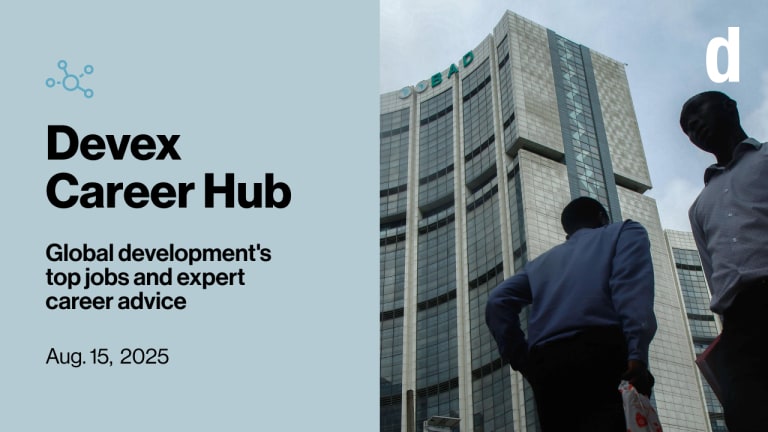
Israel’s recent 11-day assault on the Gaza Strip left the territory with $380 million worth of damage, according to a new assessment by the World Bank, United Nations, and European Union.
This is a preview of Newswire
Sign up to this newsletter for an inside look at the biggest stories in global development, in your inbox daily.
The Gaza Rapid Damage and Needs Assessment calls for the international community to support a “building back better” style initiative to help repair the embattled territory, reports Shabtai Gold. It recommends thinking beyond taking the area back to “pre-conflict levels” and focusing on long-term development goals.
• The most recent violence in May caused an estimated $190 million in economic losses, but the assessment also took into account the effects of past conflicts and of a 14-year economic blockade.
• About 40% of the $380 million affected housing: 1,600 houses were totally destroyed in May. Another concern was food insecurity, due to an estimated $45 million in damage to the farming and agriculture sector.
• The report estimates that the territory will need as much as $485 million to recover over the next two years — but it’s not clear who the donors might be. Politicians in the United States, traditionally the biggest donor to Palestinians, have been blocking aid to Gaza, demanding political concessions.
Read: Gaza could need $485M to recover from May conflict, World Bank says
Summer of discontent
What do street protests, low voter turnout, and falling trust in governments tell us that the measurement of gross domestic product cannot? They forecast discontent — which is on the rise around the world, according to a new report by the Organisation for Economic Co-operation and Development.
Devex readers will know that while societies get richer on paper, often not everyone has a slice of the pie. Widening inequality was identified by the OECD as a key driver of global discontent, alongside the climate crisis, worsening labor conditions, and patchy progress in improving well-being beyond income.
And all this has the potential to impede the eventual global recovery from the pandemic, according to the OECD. Andrew Green looks at why — and how it can be fixed.
Read: OECD: Discontent could slow countries' rebound from pandemic
Key job moves
The EBRD is getting a new secretary-general in August: Kazuhiko Koguchi, currently the bank’s director for shareholder relations. Meanwhile, United Nations Secretary-General António Guterres appointed six people to key jobs — including Estonian President Kersti Kaljulaid — and there have been staff moves at the World Health Organization, African Development Bank, European Union, and more. Pro subscribers can get the lowdown on all of June’s appointments.
Devex Pro: Who's who in #globaldev: June 2021 executive appointments
Consultation, consultation, consultation
Even with the aid cuts not yet concluded, work on the U.K.’s new development strategy has begun — and the Foreign, Commonwealth & Development Office will consult outside expert opinion on it. That’s according to Foreign Secretary Dominic Raab, who was grilled by U.K. lawmakers yesterday.
“We will be tapping the expertise and the experience of all our stakeholders,” Raab told the Foreign Affairs Committee. But there is still contention over whether the government consulted civil society on last year’s merger of the Department for International Development and the Foreign and Commonwealth Office, with Raab maintaining they did, and NGOs convinced they didn’t. Those “stakeholders” will be waiting by the phone.
Read: FCDO will consult experts on UK's new development strategy, Raab says
ICYMI: Devex has been keeping track of the U.K.’s controversial aid cuts as they happen.
Staying the course
“The U.S. and our partner countries should seek one objective: strategically help countries progress past the need for foreign assistance.”
— Jim Richardson, former director, U.S. State Department’s Office of Foreign AssistanceWhile acknowledging that most political administrations want to throw out their predecessors’ tactics, Richardson writes for Devex that it would be a mistake for President Joe Biden’s administration to toss the Journey to Self Reliance strategy, a four-year-old approach that focuses on using foreign aid spending to set countries on the path to economic independence.
Read: Opinion: The US should place development outcomes at forefront
In other news
Russia was a no-show at Tuesday's U.N. Security Council meeting to discuss the possible extension of the mandate that will allow cross-border aid into Syria. [Reuters]
The French Parliament failed to agree on the language that would add environmental protection to its constitution, a setback in the country's fight against climate change. [New York Times]
A U.S. federal appeals court on Tuesday affirmed the ruling that the IFC cannot be sued for funding the construction of India’s Tata Mundra Power Plant, which fishermen and farmers allege has damaged the environment and their livelihoods. [Reuters]
Sign up to Newswire for an inside look at the biggest stories in global development.









